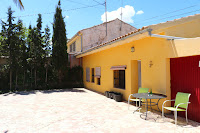 I don't normally do news. I more usually blog about what I had for breakfast but, when we were down in Alicante for the tail end of the weekend, there was a big line of taxis that went past the hotel travelling at a snail's pace and hooting their horns. They were striking in sympathy with the Barcelona and Madrid taxi drivers. And, in those two cities we have seen pictures of roads blocked by taxis, of improvised camps on key thoroughfares and attacks on the cars the taxi drivers consider to be unfair competition.
I don't normally do news. I more usually blog about what I had for breakfast but, when we were down in Alicante for the tail end of the weekend, there was a big line of taxis that went past the hotel travelling at a snail's pace and hooting their horns. They were striking in sympathy with the Barcelona and Madrid taxi drivers. And, in those two cities we have seen pictures of roads blocked by taxis, of improvised camps on key thoroughfares and attacks on the cars the taxi drivers consider to be unfair competition.There has been an intermittent battle between taxis, the sort of taxis that have to get themselves registered with the local authorities and comply with all sorts of regulations, and any other sort of private hire for years now.
Around here, ages ago, people, particularly expats, saw that there was a market for making a few euros by using their car to take somebody that they didn't know down to the airport in Alicante/Elche. The taxi drivers noticed that some cars were in the airport dropping off zone a lot and they didn't like it. There were stories about the airport run drivers finding themselves hemmed in by taxis whilst the police were called. I have no idea whether it really happened or not but the story was certainly told and retold. The airport runs still go on but, with the rise of the Internet and especially the mobile phone applications, it was only a matter of time before somebody came up with a more systemised way of undercutting traditional taxi services and their metered charges.
I think that Cabify was one of the first and I think they are Spanish. So far as I understand it they have always used what I would describe as chauffeur driven cars. I think that Addison Lee offer something similar in the UK though, as I picked that reference up from some song lyrics, I may well be wrong. Again, as I understand it, the idea is very neat. A cadre of insured, tested, and registered vehicles with professional drivers that could be used to transport people from A to B already existed. All that was needed was something easy to use which could put potential passengers in touch with drivers and their vehicles. Cabify produced that interface. The cars they use were, I suppose, the cars traditionally used for weddings, funerals and shifting business people around. In Spain they are labelled as Vehículos de Turismo con Conductor or VTC - private cars with drivers.
Then of course there was Uber. Without bothering to do any decent research my basic understanding is that Uber was just one up from the airport run except that the Uber interface did away with the need for the word of mouth recommendation. The application existed solely to put drivers and passengers in touch. That model quickly ran into legal problems in Spain so Uber relaunched itself using chauffeur drive cars just like Cabify.
So the "proper" taxi drivers were a bit upset. They were losing business to these people. They fought back by claiming that the new firms were flouting legislation and, at the moment, their argument is that the VTC cars should be limited to a ratio of thirty taxis to one VTC. They argue that VTC cars were never supposed to be an alternative to taxis and that the premise was that VTCs and cabs operated in different markets.
Now I don't know about you but the reason I don't use taxis a lot is that they cost too much. I know that if a gang of people get a taxi on a Saturday night to go clubbing it seems reasonable enough but, when you get off an aeroplane lost in some city and decide to use a taxi to get you to the hotel it costs lots and lots, sometimes as much as the flight. In my case it's only because I'm on holiday and primed for spending cash that I don't cry. I also know that taxis are generally only available where there are plenty of people. So it's easy to get a taxi in Barcelona and not so easy to get one in Pinoso. In fact I'm never sure whether we have a taxi in Pinoso or not. I use taxis when I'm a bit lost, when I can't be bothered to cart suitcases around, when somebody else is paying, when my car is in the garage and I need to get back to work quickly and maybe because the public transport alternatives are infrequent or non existent.
To be honest my one experience of trying to use a mobile phone application to get a car was not that satisfactory either. It took a fair while to set up the details on the application and when I sent the location a driver phoned me back to say that he couldn't pick me up from wherever I was because only licensed taxis could collect there. So I found myself hot and bothered from dragging suitcases around trying to cup the mobile under my chin, shouting into it above the din of the traffic, in a language that is not my first, trying to describe what I saw to a driver who was only hundreds of metres away. It was all a bit fraught. And to be honest the final fare didn't seem to be that low either. I wondered if it might have been easier to walk out of the train station and put my cases into the back of a traditional taxi.
So I'm all for competition driving down prices and the Internet applications seem like a simple and effective way to do that. After all taxis are a bit of a left over from times long gone, a licenced monopoly that doesn't seem quite right in 21st Century Europe. It also seems inevitable. Legend has it that Ned Ludd, a textile worker who smashed a couple of modern machines, gave his name to the term Luddite. Over time Luddite has grown to mean opposition to industrialisation, automation, computerisation and newer technologies in general. It seems to me that's where the taxi drivers are. George Harrison said that All Things Must Pass and that's what lamplighters, coal merchants and Blockbuster video have all done. Taxi drivers are of the same stuff. They are on a loser unless they change and adapt. Camp out as they like on the Castellana or the Gran Via; block the traffic for a couple of days if they must but it won't, in the end, make any difference.





















